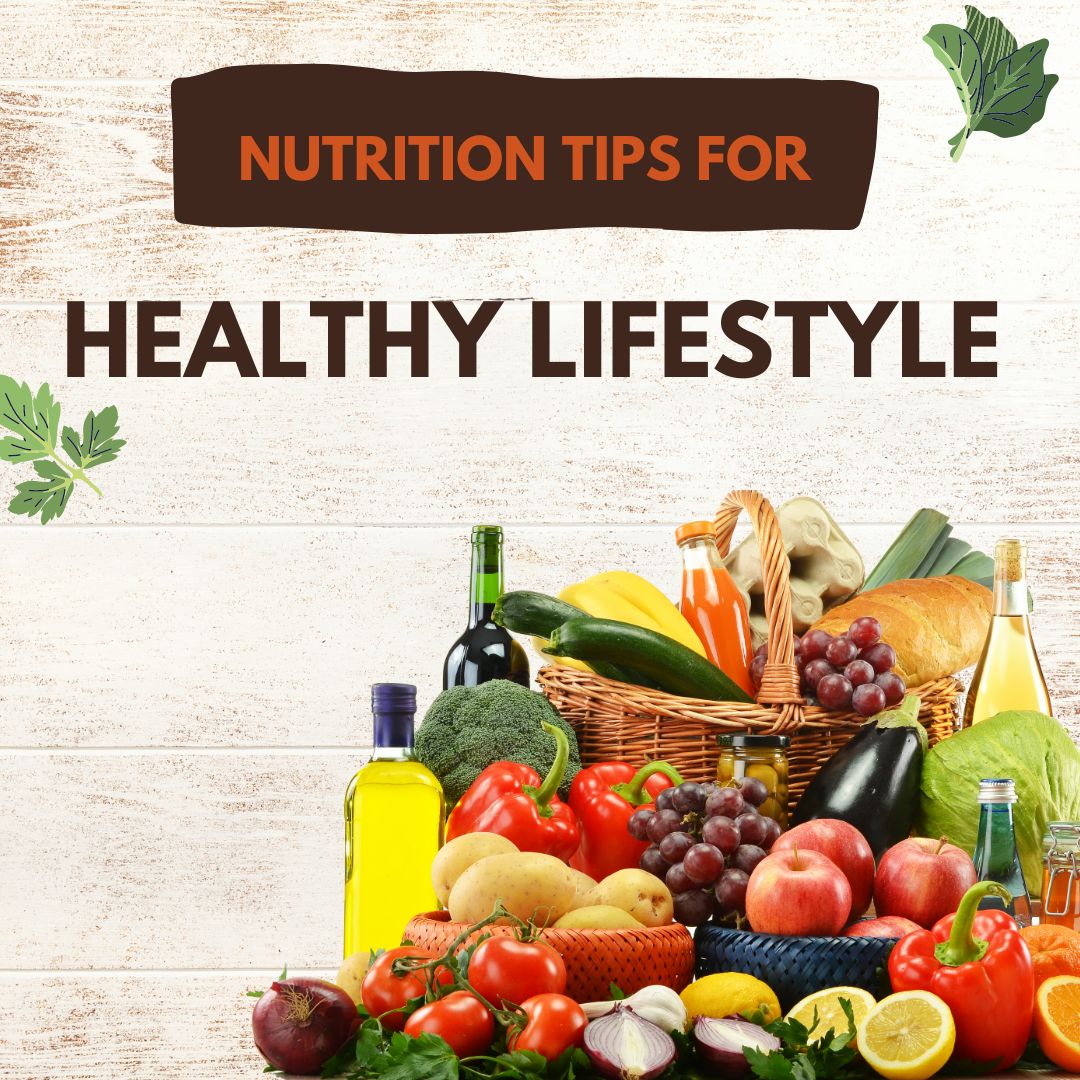In the quest of keeping fit, eating healthy forms a big part. Here are 10 Nutrition Tips For a Healthy Lifestyle
Table of Contents
1.Eat a Variety of Foods:
Your goal should be to include a variety of different foods in your diet so that you get all the necessary nutrients your body needs. As opposed to processed foods, it is more beneficial for your health to eat fresh fruits and vegetables daily. They also contribute dietary fiber, which keeps you feeling full for longer periods of time. This includes grains like brown rice, wheat products like barley and vegetable such as broccoli, peas and sweet potatoes Group- Each group of food helps you with various valuable vitamins, minerals or other active ingredients. One example is dark leafy greens, which have high iron and calcium, while citrus fruits are loaded with vitamin C. Another benefit of consuming a wide range of foods is enhanced nutrition as well as keeping meal times interesting

2.Portion Control:
How you manage your eating plays a key role in staying healthy and not overindulging when it is of the essence to avoid obesity and maintain a healthy weight. To fool your brain into thinking that you are eating less, use smaller plates and bowls. You should read the serving size recommended in the food packages and try to follow them. If you savor slowly, that could also help. It is about 20 minutes before your mind notifies you that you are no longer hungry. Practice up to completely full instead of overeating by enjoying every bite until you reach there, even if you don’t feel it fully yet.

3.Stay Hydrated:
One of the many processes in our body that water takes care of is digestion which also helps regulate body temperature and lubrication of joints. Try to make 64 oz of water your daily target, but bear in mind that people’s needs are different. Things such as exercise, hot weather, and your general health can boost demand for hydration all around you. Keep a reusable water bottle by your side, and arrange to be reminded throughout the day to drink water. Adding produce such as cucumbers, watermelons, and oranges into your diet will also help promote hydration system.

4.Limit Processed Foods:
Processed foods usually have high levels of trans-fats, sugars and salts much more than fresh foods and vegetables; which in turn may lead to the above-mentioned health issues. These ultra-processed food products are also very poor sources of nutrition. Show your preference for the whole unprocessed food category by selecting fresh fruits, vegetables, whole grains, and lean meats whenever possible. By cooking from scratch you will be able to control what goes into the dish and keep it free from unwanted preservatives or other add-ons. An additional way of ensuring that you make healthier choices is by checking up on the amount of sugar, salt and unhealthy fats that are hidden in the product through reading the labels.

5.Eat More Fruits and Vegetables:
Fruits and vegetables are the best sources of vitamins, minerals, fiber and also of antioxidants which are all needed just to be healthy. You should try to allocate approximately half of your plate in each meal for fruits and vegetables. Often, different colors indicate different nutrients so it is good to eat a rainbow of produce. For instance, you get beta-carotene in good supply when you include carrots as well as sweet potatoes in your diet, while berries and leafy greens are great sources of antioxidants. Fresh, frozen or canned (in water without salt) options are all fine.

6.Choose Whole Grains:
Only whole grains keep all sections of the grain intact and thus are a richer source of fiber, vitamins, and minerals compared to refined grains. They are exemplified by quinoa, brown rice, whole wheat, barley and oats. Incorporating whole grains in your diet can do help to control blood sugar levels, improve digestion, and lower chronic diseases such as heart disease and type 2 diabetes. First step is to replace refine grains with alternatives that made from whole-grain e.g. use brown rice instead of white rice or whole-grain bread instead of white bread.

7.Healthy Fats Are Important:
Healthful lipids are vital for brain operation, energy, and also vitamin metabolism. Concentrate on the inclusion of unsaturated fatty acids into your diet; thus, you can benefit from avocados, nuts, seeds, and olives. For example, Omega-3 fatty acids, which are found in oily fish like Salmon and Flaxseed, are very good for the heart. Of course,you should not only pay attention to this type of healthy fats but also keep in mind that they need to be consumed in moderation as well. Trans fats should be avoided and saturated fats such as butter, processed snacks and fatty cuts of meats should be taken with caution.

8.Limit Added Sugars:
Sugar overconsumption is dangerous. It affects health through weight gain, and insulin issues, and also it can pose the risk of chronic diseases, e.g. type 2 diabetes and heart disease. Watch out for sugars added to foods and drinks, those found in soda, candy, baked goods or even products that seem healthy like flavored yogurt and granola bar. Check food tags for covert sugars under many names such as high-fructose corn syrup, sucrose, or maltose salt. Select fruits as your natural sweeteners: bananas or beets; use cinnamon or vanilla to add sweetness to your foods without adding sugar

9.Moderate Your Salt Intake:
An overabundance of sodium is perilous in that it results in high blood pressure and cases of heart diseases, including strokes. Processed as well as restaurant foods are the biggest sources of salt in our diet. Cooking at home more often and using herbs, spices, and seasonings instead of salt to flavor your food will help you to reduce your daily salt intake. While doing your shopping, go for products that are low in sodium or no-salt-added options; read labels for you to keep an eye on sodium, and be below 2300 milligrams per day or less if you have some health conditions.

10.Mindful Eating:
Mindful eating is all about giving a very detailed look at the experience of eating and drinking, within and without your body. It requires that you eat slowly, savor each bite, and be aware of your hunger and fullness signals. Or do something else like watching TV or using smartphones while eating. Through concentrating on what you are consuming, you may improve your digestion, find pleasure in food to a greater extent as well as read the signals of your body which later on can help to prevent overeating. Mindful eating brings about a healthy perspective of food interacting many valuable qualities such as an attitude of thankfulness and respect towards what you eat.
The detailed guide for the advice above will help you get better health and well-being overall. Please note that sometimes making many small changes gradually is more effective than efforts made to implement a complete dietary change quickly.
